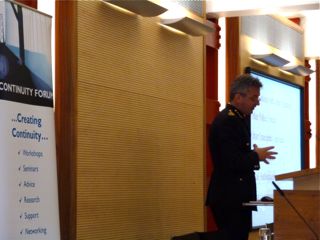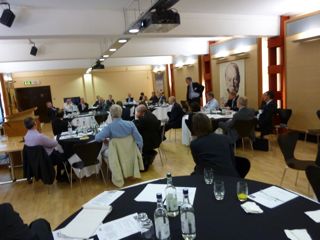A day in the War Rooms
Business Continuity Forum BCM
On May 18th we took over the Churchill War rooms in Westminster for our Managing Risk event.
Many who have attended other events will have become familiar with our patronage of the Imperial War Museum in Lambeth, but for the first time we used the refurbished World War Two War Rooms, located underneath the Treasury building in Whitehall.
The War Rooms have probably one of the most discreet entrances of any venue I have seen. Sara had visited previously to ensure it would be suitable for our guests, but unusually in this instance I had not. The initial impressions were, I have to confess, not good... A small, rather dimly lit maze that was a superb museum, but which on first contact I thought was possibly a mistake. Thankfully this reaction was soon changed as we emerged from the tunnels into the conference area. The grim surroundings were transformed into a bright spacious environment virtually perfect for our day.
After the usual get-together chat meeting old friends and new, we kicked off the day with an excellent presentation from Commissioner Mike Bowron of the City of London Police and the ACPO lead for Business Continuity. Mike is always an engaging and enthusiastic speaker and his commitment shines through. Talking across a number of themes, Mike used numerous examples of how "his patch" had been affected by terrorism and a range of  other disruptions. He also spoke on the preparations and the partnerships that were necessary between the police, government and the business sector if planning is to be truly effective. Looking ahead he felt as though the experience we have seen in recent years, both in London and further abroad, is likely to continue and that it is incumbent on all of us to be vigilant and thorough in our preparations.
other disruptions. He also spoke on the preparations and the partnerships that were necessary between the police, government and the business sector if planning is to be truly effective. Looking ahead he felt as though the experience we have seen in recent years, both in London and further abroad, is likely to continue and that it is incumbent on all of us to be vigilant and thorough in our preparations.
A number of points were stressed particularly relating to the support and resources available to organisations and business through the police and local authorities. Of particular significance are the Counter Terrorism Security Advisers, who are embedded in all police forces across the country. These CTSA's are available to advise on all aspects of preparation and planning, with the aim of building the resilience of organisations and consequently our communities. Their services are free and they can be contacted through the local police station, via the Force website or indeed by contacting us at the Continuity Forum.
Mike also spoke on a range of other initiatives, such as Projects Griffin and Argus, that provide specific support in the community. We had a number of serving officers in attendance on the day, who were able to contribute to the discussions throughout the session, and this is a feature that we hope to continue as the exchange of information proved valuable to all.
We have been working for many years with the National Counter Terrorism Security Office (NaCTSO), and we will soon be announcing a new tool that has been developed to help organisations access their own positions... more news on this soon.
Dr Ian Robertson of IBM then shared his experience on the development of security issues and structures that are now challenging organisations as our operational infrastructures continue to develop in complexity at a rapid pace.
We were also pleased to be joined by James Crask, who shared the current and developing plans for the broader management of the Olympics across not just London, but the country. When confronted with the sheer complexity and scale of the task you very quickly see that there is huge potential for disruption, even if you're not actually at the Games. Looking at the stresses on our transport infrastructure, the logistics supporting the Olympics and the sheer number of visitors involved has certainly convinced me that all organisations should be thinking about how they may be affected. Now, I am a huge fan of the Olympics and will doubtless be visiting the games (I have even volunteered to help out), but for two months the UK will not just be in the world spotlight - it will be tested. It does not matter if you are a large or small organisation, or indeed whether or not you are near the Olympic sites; I feel there will be some "contact", shall we say, that may disrupt your normal operations.
I had the task of pulling some of the threads together and perhaps both challenging our experience gained to date and pointing to how the industry may be developing. It is pretty easy to look around and see the potential for disruption, but one of my core themes was highlighting the need to show the real return on investment for organisations who undertake both Risk & Business Continuity Management. In a pretty lively conversation with our delegates, we were quickly able to establish that there remain numerous real challenges within organisations and also more broadly across the business landscape.
I have to say that whilst I was not able to fully partake of lunch, the feedback was that it was probably one of the best we have had, and whilst arriving late at the tables I think I managed to seriously damage a plate of rather tasty sausages.
The afternoon sessions were much more interactive, and we kicked off with one of our debate sessions that we will be featuring in an article shortly. Usually these are done with smaller groups, and provide input into our policy and research programmes. However, with the diverse experience of delegates this was an ideal opportunity to try out the debate format with a larger group. A range of policy statements - using the format "This House believes" - were posed to the various tables and then debated. Within this subset group, the key points were then highlighted and presented to the room with a vote being taken. I have to say I think I might have to work on my explanation of the process as there were a number of rather confused faces at the start, but rapidly the level of conversation and debate rose; so much so that we were struggling to bring the conversations to an end in a timely fashion. These sessions are hugely valuable to us in the smaller format and from both the feedback received and our experience of working in the larger group, this is likely to be a theme of our events going forward. We felt that the interaction and experience sharing between people from completely different backgrounds on key issues within the industry was well worthwhile and generally was a great success. (Well done Sara, you have convinced me.)
Two more breakout sessions were then held by IBM, looking separately at Security and Business Resilience, enabling further discussions and focus to be applied to the broader themes that have been established during the day.
One of the indicators of how well an event has gone is how long it takes people to leave, and it was great to see so many people chatting, networking and discussing what had been shared after the close of the event. We will be revisiting Managing Risk as a core theme later in the year, when we will have developed further information to share extending the thinking and enhancing perhaps even more debate.
I would particularly like to thank Carolyn Williams of the Institute of Risk Management, for her help facilitating in the afternoon, IBM for their support of the Continuity Forum and to all our delegates and speakers that made today not just informative, but actually a lot of fun too













